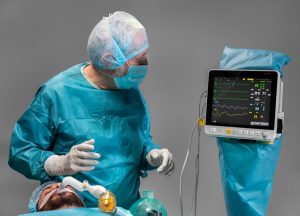Functional Endoscopic Sinus Surgery
1. What is the condition about?

2. What are the causes?

- Infections: Viral, bacterial, or fungal infections can lead to sinusitis by triggering inflammation of the sinus linings.
- Allergies: Allergic reactions to allergens like pollen, dust, pet dander, or mold can result in chronic sinusitis.
- Nasal Polyps: Noncancerous growths in the nasal passages can obstruct sinus drainage, leading to chronic sinusitis.
- Deviated Septum: A deviated or crooked nasal septum can block sinus passages, hindering proper airflow and drainage.
- Environmental Irritants: Prolonged exposure to smoke, pollution, and other irritants can irritate and inflame the sinuses.
- Respiratory Infections: Conditions such as the common cold or flu can cause acute sinusitis, which may become chronic if untreated.
Understanding the underlying causes of chronic sinusitis is vital for choosing the most appropriate treatment, including FESS.
3. How common is the condition?
Chronic sinusitis is a prevalent condition worldwide, affecting millions of people across various age groups. The exact prevalence may vary by region, climate, and population, but it is estimated that a significant percentage of individuals experience chronic sinusitis at some point in their lives.
Global Prevalence:
- In the United States, over 30 million people are diagnosed with sinusitis annually.
- In Singapore, chronic sinusitis is not uncommon, with a substantial number of individuals seeking treatment for related symptoms.
Certain risk factors, such as a history of allergies, asthma, or recurrent sinus issues, may increase the likelihood of developing chronic sinusitis.
4. What can an ENT Specialist do for you?
Consulting with an Ear, Nose, and Throat (ENT) specialist, also known as an otolaryngologist, is essential for effectively managing chronic sinusitis and related sinus issues.
The Role of an ENT Specialist:
ENT specialists have the expertise and specialized equipment to accurately diagnose the underlying causes of sinus issues, whether they are due to infections, allergies, structural abnormalities, or other factors.
After a thorough evaluation, an ENT specialist can develop a personalized treatment plan tailored to the patient’s specific condition and needs. This may include medication, lifestyle modifications, or surgical options like FESS.
ENT specialists are trained in performing minimally invasive surgical techniques like FESS, which offer shorter recovery times, reduced discomfort, and minimal scarring compared to traditional surgery.
ENT specialists provide ongoing care and monitoring to ensure the best possible outcomes. They can also address any complications or recurrent issues effectively.
Consulting with an ENT specialist ensures that patients receive the most appropriate and advanced care for their sinus conditions, potentially leading to improved quality of life and symptom relief.
5. How can the condition be treated?
The treatment of chronic sinusitis depends on its cause, severity, and duration. Various treatment options are available, ranging from conservative approaches to surgical interventions like FESS.
Treatment Options for Chronic Sinusitis :

Medications
In many cases, chronic sinusitis can be managed with medications such as antibiotics (for bacterial infections), antihistamines (for allergies), and decongestants (to relieve congestion).

Lifestyle Modifications
Lifestyle changes, such as avoiding triggers, using humidifiers, and practicing good nasal hygiene, can help alleviate symptoms and prevent recurrence.

Minimally Invasive Procedures
FESS is a highly effective minimally invasive surgical option that involves the use of an endoscope to access and remove blockages within the sinus cavities, promoting proper drainage.

Traditional Sinus Surgery
In cases of severe or recurrent sinusitis, traditional sinus surgery may be necessary to remove obstructions and correct structural issues.
FESS has gained popularity due to its effectiveness, minimal discomfort, and shorter recovery period compared to traditional sinus surgery. The procedure is performed on an outpatient basis, allowing patients to return to their daily activities sooner.
6. Guidelines for Surgery
Functional Endoscopic Sinus Surgery (FESS) is a specialized surgical procedure that requires careful preparation and adherence to guidelines to ensure a successful outcome.
Pre-operative Preparations: Before undergoing FESS, patients should:
- Consultation: Have a thorough consultation with their ENT specialist to confirm the need for the procedure and discuss expectations.
- Medical History: Provide a comprehensive medical history, including allergies, medications, and previous surgeries.
- Medication Review: Discuss the discontinuation or adjustment of certain medications, such as blood thinners, with their healthcare provider.
- Fasting: Follow fasting instructions provided by the surgical team to prevent complications during anesthesia.
The FESS Procedure: During the FESS procedure:
- Anesthesia: Typically, local anesthesia with sedation is used to ensure patient comfort during the surgery.
- Endoscopic Guidance: The surgeon uses an endoscope, a thin, flexible tube with a camera, to visualize and access the sinus cavities.
- Sinus Exploration: The surgeon removes obstructions, polyps, or diseased tissue within the sinuses, promoting proper drainage and restoring normal function.
- Nasal Packing: In some cases, dissolvable nasal packing may be used to support healing.
- Sinus Rinsing: Saline irrigation may be performed to cleanse the sinuses before closing the incisions.
Recovery and Post-operative Care: After the procedure:
- Recovery Room: Patients are monitored in a recovery area to ensure their vital signs are stable.
- Home Recovery: Most patients can return home on the same day with instructions for post-operative care.
- Medications: Antibiotics and pain relievers may be prescribed to prevent infection and manage discomfort.
- Follow-up: Scheduled follow-up appointments are essential to monitor progress and address any concerns.
7. Evaluation & Follow Up for Treatment
Post-operative evaluation and follow-up are crucial aspects of successful FESS treatment.
Follow-up Appointments: Patients should attend all scheduled follow-up appointments with their ENT specialist to:
- Assess Healing: The specialist will evaluate the healing process, ensuring the sinuses remain open and free of infection.
- Symptom Monitoring: Any persistent or recurrent symptoms, such as congestion or facial pain, will be closely monitored during follow-up appointments.
- Adjustments: If necessary, the treatment plan may be adjusted based on the patient’s progress and response to the procedure.
Long-term Care: Long-term care and management may include:
Lifestyle Modifications:
Proper Hydration: Staying well-hydrated is essential for maintaining healthy sinus function. Adequate hydration helps keep the mucous membranes in the nasal passages moist, allowing for better mucus production and clearance. Aim to drink plenty of water throughout the day to support sinus health.
- Balanced Diet: A well-balanced diet rich in vitamins and minerals can bolster your immune system and help your body fight off infections that may lead to sinusitis. Incorporate a variety of fruits, vegetables, lean proteins, and whole grains into your diet to ensure you’re getting the nutrients your body needs.
- Regular Exercise: Engaging in regular physical activity can improve overall circulation and promote healthy sinuses. Exercise can also help reduce stress, which can exacerbate sinus symptoms. Aim for at least 30 minutes of moderate exercise most days of the week.
- Stress Management: Chronic stress can weaken the immune system and worsen sinusitis symptoms. Implement stress-reduction techniques such as yoga, meditation, deep breathing exercises, or mindfulness practices to help manage stress and improve your overall well-being.
- Smoke and Allergen Avoidance: If you smoke, consider quitting or avoiding exposure to secondhand smoke, as smoke can irritate the nasal passages and worsen sinusitis. Additionally, identify and minimize exposure to allergens that trigger your symptoms, such as pollen, dust, or pet dander.
- Proper Sleep: Getting adequate and quality sleep is crucial for overall health and immune function. Ensure you maintain a regular sleep schedule and create a comfortable sleep environment to support restful sleep.
By incorporating these lifestyle modifications into your daily routine, you can help maintain sinus health, reduce the risk of chronic sinusitis recurrence, and support overall well-being.
- Regular Follow-up: Continuing with scheduled follow-up appointments with the ENT specialist for ongoing monitoring and evaluation of sinus health.
- Allergy Management: For patients with known allergies, effective allergy management and avoidance of allergens can significantly reduce the risk of recurrent sinus issues.
- Nasal Hygiene: Practicing good nasal hygiene, such as regular saline rinses and keeping the nasal passages moist, can help maintain sinus health.
- Environmental Control: Taking steps to reduce exposure to environmental irritants, such as avoiding smoking and minimizing exposure to air pollution, can further prevent irritation and inflammation of the sinuses.
- Healthy Lifestyle: Adopting a healthy lifestyle, including proper hydration, a balanced diet, and regular exercise, can contribute to overall well-being and immune system support, reducing the likelihood of infections.
8. Risks of Surgery
While Functional Endoscopic Sinus Surgery (FESS) is generally considered a safe and effective procedure, like any surgery, it carries some inherent risks. It’s crucial for patients to be well-informed about these potential risks.
Possible Risks and Complications:
- Bleeding: Some bleeding is common during and after the procedure, but it is usually temporary and manageable.
- Infection: Infections are rare but possible; prompt treatment is essential to prevent complications.
- Perforation: There is a slight risk of unintentional perforation of the sinus lining during the procedure, which can typically be repaired if necessary.
- Loss of Smell: In rare cases, a temporary or permanent loss of the sense of smell (anosmia) may occur, although this is uncommon.
- Recurrence: While FESS is highly effective, sinusitis symptoms may recur in some cases over time, necessitating additional treatment or adjustments to the initial procedure.
It’s essential for patients to discuss any concerns about potential risks with their ENT specialist during the consultation process. Additionally, adherence to post-operative care instructions can help minimize these risks and promote a successful recovery.
9. Alternatives to Surgery
While FESS is a highly effective treatment for many individuals, it’s not the only option. Alternatives to surgery should be considered based on the patient’s specific condition and needs.
Alternative Treatment Options:
- Medications: For mild to moderate cases of sinusitis, medications such as antibiotics (for bacterial infections), antihistamines (for allergies), and decongestants (to relieve congestion) may provide relief.
- Nasal Irrigation: Using saline rinses or neti pots can help clear mucus and alleviate symptoms.
- Allergy Management: Identifying and managing allergies can significantly reduce the risk of future sinus problems and may decrease the need for surgical intervention.
- Traditional Sinus Surgery: In cases of severe sinusitis, recurrent sinus infections, or structural abnormalities, traditional sinus surgery may be recommended to address specific issues.
The choice of treatment, whether FESS or an alternative, should be made in consultation with an ENT specialist after a thorough evaluation of the patient’s condition, medical history, and specific needs. The goal is to determine the most appropriate and effective treatment plan to provide long-lasting relief from chronic sinusitis symptoms.

